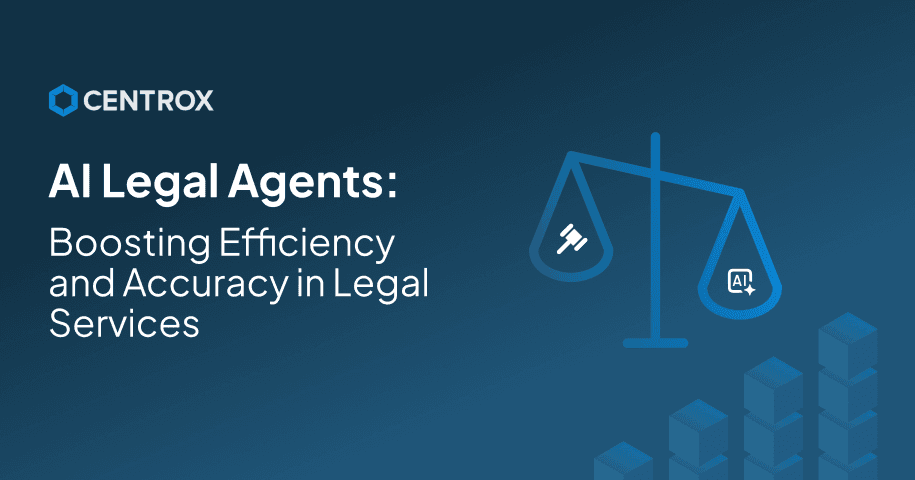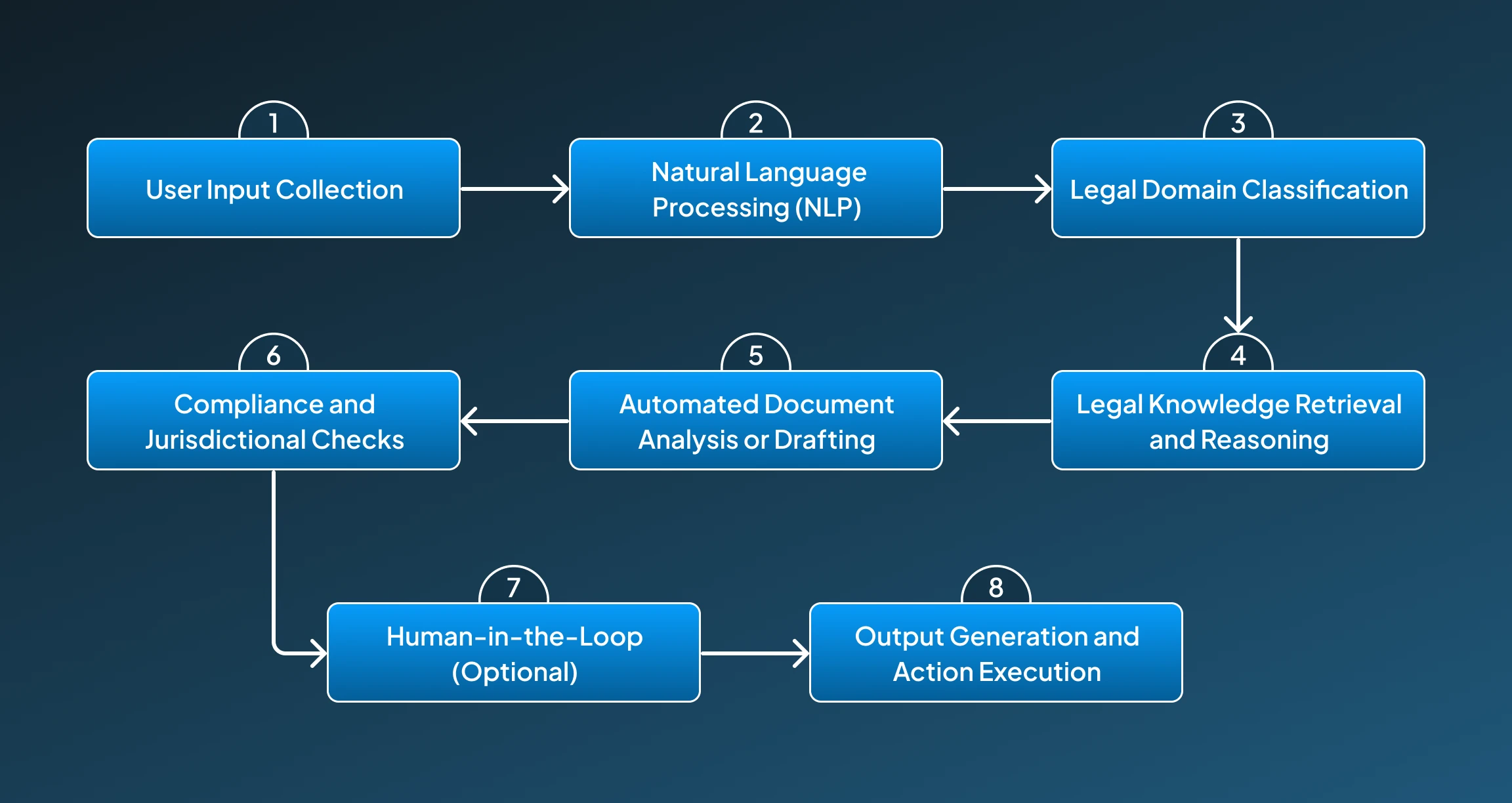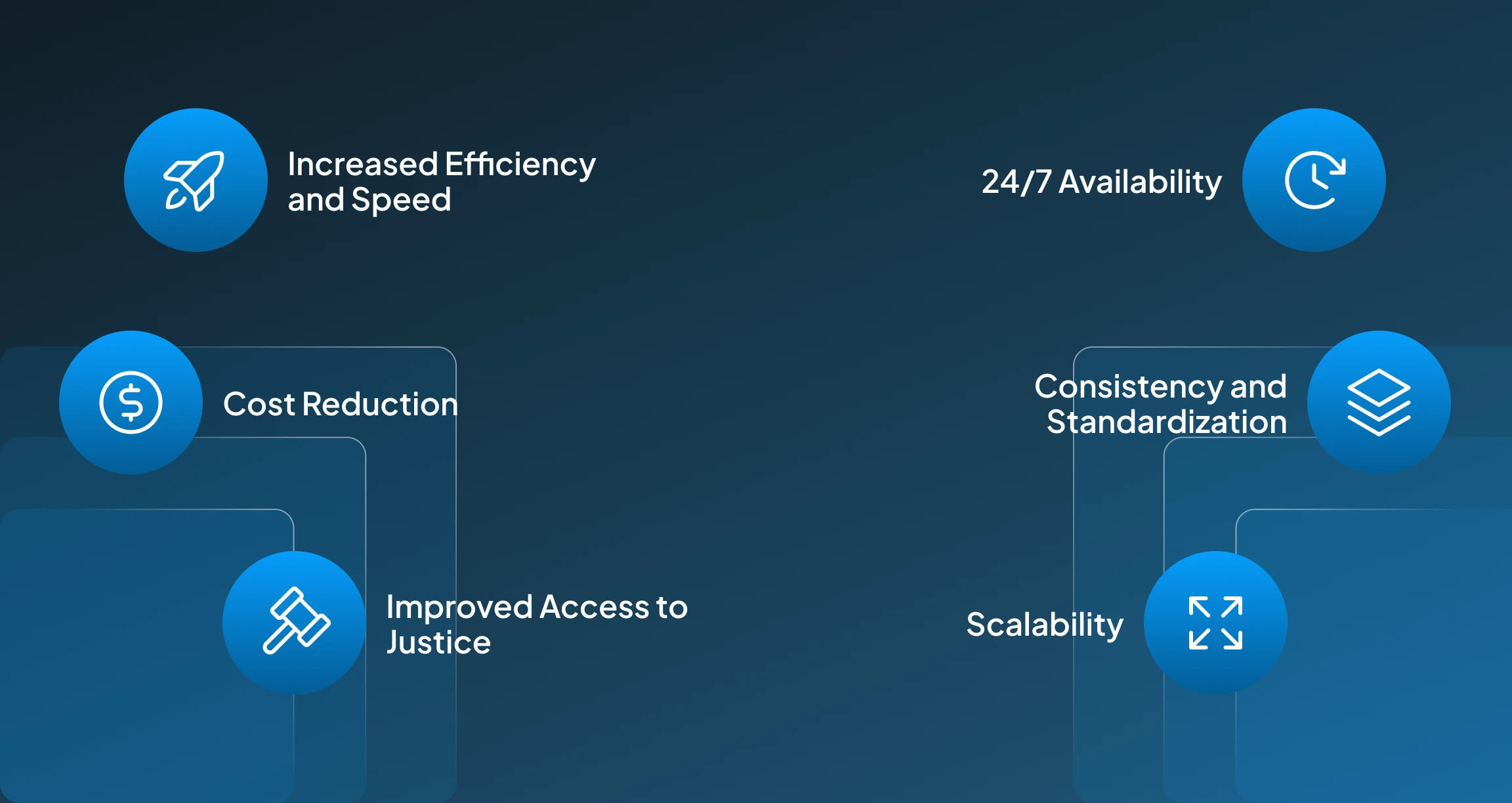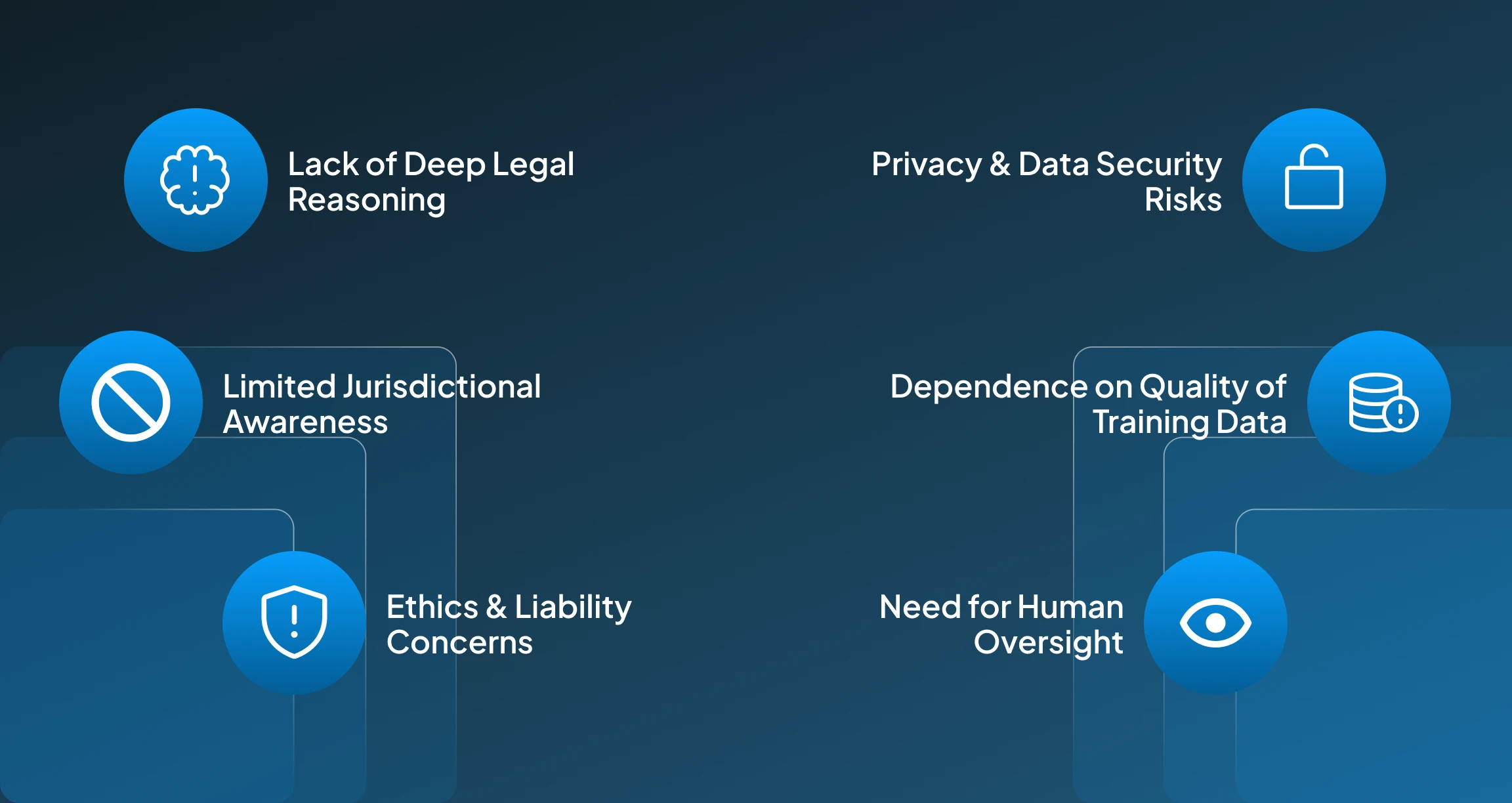AI Legal Agents: Boosting Efficiency and Accuracy in Legal Services
Understanding AI legal agents, how they work, applications, advantages and limitations, and learn how they are enhancing legal operations.
8/11/2025
artificial intelligence
10 mins

With AI agents coming in, we are witnessing smarter-than-ever advancements for various critical applications like healthcare and legal advisory. AI agent-powered solutions for legal advisory are, therefore, emerging as innovative applications to enhance accessibility and convenience.
Traditionally, the entire legal process cycle is slow and complex to understand. In such scenarios, for most people, having access to reliable legal advice is one of the major restrictions. Here, AI legal agents not only appear as a convenient help, but also help in making you grasp the legal complexity whenever, wherever, or however you need it.
In our article, we will find how AI agents are bridging the gaps between legal assistance and end-users to boost efficiency and accuracy in legal services. This will assist you in getting a deeper look at how AI legal agents work, their applications, and you will be informed about the benefits and limitations, to keep you ahead of these challenges.
AI Legal Agents
AI legal agents are an AI-driven solution introduced to help with legal tasks by resembling the cognitive functions of legal professionals. Such agents work for interpreting legal knowledge, analyzing the documents, extracting relevant information, alongside interacting with the end users in natural language to provide them with legal guidance.
Why are AI Agents Needed for Legal Assistance?
The conventional process for acquiring legal assistance is complex, inconvenient, and expensive, delaying the justice procedure. Here, scheduling an appointment with a credible legal advisor to get an initial expert opinion on the matter requires strong finances and time.
Also, considering the socio-political differences among the population, not everyone unfortunately has access to this basic right. This inequality of access to legal advice further widens the gap between different segments of society, encouraging hatred towards one another. This created space for an AI agent-powered solution that extends affordable and reliable legal assistance to everyone. As said by Daniel Martin Katz (Professor of Law & Data Scientist):
“The future of law is about scalable, data-driven legal solutions. AI can empower us to close the justice gap.”
This sheds light on how AI can make legal operations smarter, efficient, and scalable, helping to close the justice gaps. As such, tools provide expert, unbiased, and realistic legal guidance to the user interacting with them, helping them in planning the best way out with the minimal resources they have.
How do AI Legal Agents Work?
AI Legal Agents has a methodology that executes behind the scenes to drive efficiency and accuracy for your legal queries. This methodology follows a specific series of steps to compute contextually accurate responses for your legal requirements. For your help, we have provided a step-by-step breakdown of how these AI legal agents work to extend you a deeper insight:

Step 1: User Input Collection
So, the AI legal Agent begins their functioning right after the user submits a query or request. The system then takes the raw input, either in text or audio format, which is further processed. This step initiates the AI’s response pipeline.
Step 2: Natural Language Processing (NLP)
After the input is received, the AI can utilize natural language processing to understand and interpret the user's request. This analyzes the sentence structure, identifying key legal terms like contract types, dates, and jurisdictions to identify users' intent, allowing the system to understand what users need, even if the language is not properly structured.
Step 3: Legal Domain Classification
In the next step, the system works to classify the user’s query in a particular legal space which such as contract law, employment law, or family law. Through such classification, it narrows down the scope of response to ensure AI searches and applies the most correct legal rules and knowledge for the shared issue. For this step, usually, machine learning classifiers trained on large legal data are used.
Step 4: Legal Knowledge Retrieval and Reasoning
After classifying the domain of input, the AI agent then starts retrieving information from the legal database, case law repositories, or internal knowledge bases. To perform this task of information retrieval, RAG or keyword-based search is used. These models extract the facts, laws, or precedents. But for more advanced applications, symbolic reasoning or rule-based logic is needed to assess how those laws work in a user's specific situation.
Step 5: Automated Document Analysis or Drafting
If the assigned task or query requires a legal document such as a contract, lease, or compliance, the AI operates to analyze the underlying structure, extracts the clauses, identifies the anomalies, and suggests a few edits. To draft such legal documents, the AI tools are trained on large templates to tailor them according to users' demands.
Step 6: Compliance and Jurisdictional Checks
Then, when the automated document analysis or generation is done, the generated output is validated against the compliance standards. This step validates whether the solution aligns with the defined laws. ensure the legal output is valid and contextually appropriate, the AI performs compliance checks. This may involve referencing up-to-date regulatory data and identifying any red flags that could lead to non-compliance or legal risk.
Step 7: Human-in-the-Loop (Optional)
Also, to avoid disruption and compromised output generation for sensitive tasks, the AI may utilize a “human-in-the-loop” workflow. Through the inclusion of this step, it ensures that the generated responses remain consistent in their accuracy, accountability, and ethical compliance, and avoid legal ambiguity.
Step 8: Output Generation and Action Execution
In the final step, the AI agents make the final decision either by providing legal advice or suggesting a series of actions. Depending upon its development in integration, such tools can also be used for sending legal notices, submitting forms to government portals, or scheduling a consultation. The output is typically delivered through the same interface the user began with.
Applications of AI Legal Agents
AI Legal Agents can extend transformative applications, making legal processes user-friendly, convenient, and reliable. The integration of such AI agents for legal procedures can essentially speed up the work efficiency of the legal and judicial system. Below, we have listed some areas where the application of AI legal agents not only streamlines tasks but also emerges as a smarter solution:
1. Legal Research Automation
AI legal agents can efficiently analyze large volumes of complex legal texts such as case law, statutes, and regulations to retrieve relevant information. With such an application, it minimizes the time and cost spent on the conventional legal research process to make for rational decision-making.
2. Document Review and Contract Analysis
Such AI legal agents can be utilized to review documents and complex contracts. Through such reviews, it identifies the gaps, anomalies, also flags non-compliance. This is particularly useful during due diligence, mergers, acquisitions, and regulatory reviews.
3. Legal Document Drafting
AI legal agents hold the ability to generate tailored contracts, NDAs, wills, legal letters, and agreements by utilizing the templates and the provided user input. Streamlining repetitive legal drafting tasks contributes to enhancing consistency.
4. Compliance Monitoring
For regulating industries, AI agents can help by continuously tracking evolving legal requirements and regulations. By alerting businesses to potential non-compliance, they can help them adjust policies in real time, minimizing legal risks.
5. Self-Help Legal Support for the Public
With conversational interfaces or chatbots, these AI legal agents can extend legal guidance and advice to individuals facing everyday issues like tenant rights, parking tickets, or family disputes. Through such advancements, it improves access to justice for underserved populations.
6. Litigation and E-Discovery Support
AI agents can play a key role in assisting law firms and in-house teams by sorting evidence, summarizing cases, and managing large document sets during litigation. By performing this responsibility, they can improve case preparation speed and accuracy in discovery workflows.
7. Real-Time Courtroom and Case Support
AI legal agents can be integrated to perform live assistance during trials or hearings in a real environment. It can help by providing relevant precedents, summarizing arguments, or even tracking courtroom dialogue.
Benefits of AI Legal Agents
AI legal agents can bring transformative benefits to the legal space by handling operations, reducing costs, and enhancing accessibility. For your convenience, we have listed some key benefits that highlight how these intelligent systems are improving legal service delivery for professionals, businesses, and the general public.

1. Increased Efficiency and Speed
“Recent studies have suggested that AI-enabled legal tools can effectively contribute to research processes by reducing the research time from 4-6 hours to 45 minutes. Also, it can analyze the document and generate legal content in seconds, while improving accuracy too.” (Chukwuemezie et al., 2025)
2. Cost Reduction
By automating routine legal responsibilities, AI significantly helps in minimizing the over-reliance on expensive legal services, which are out of the financial reach of people belonging to different financial backgrounds. This not only makes legal services accessible for everyone, but also makes it more convenient.
3. Improved Access to Justice
Such AI-powered self-help legal tools reduce the entry barrier for people who can’t afford traditional legal services, especially in underserved or remote communities, by allowing them to access legal advisory services from anywhere around the world.
4. 24/7 Availability
Contrary to human lawyers, these AI-driven legal agents can extend assistance and guidance around the clock. This 24/7 availability of AI legal agents helps users in receiving legal advice on their complex cases at any time it’s needed.
5. Consistency and Standardization
AI delivers uniform legal outputs by minimizing human bias, fatigue, and oversight, which are crucial for large-scale document review or compliance tasks.
6. Scalability
AI agents can handle thousands of queries simultaneously, making them ideal for large law firms, legal helplines, and enterprise use.
Limitations of AI Legal Agents
While AI legal agents bring countless benefits, they also hold some limitations. By understanding these challenges, we can ensure the preparation of a responsible AI solution that maintains legal integrity. Below, we have highlighted a few limitations that AI Legal Agents can face:

1. Lack of Deep Legal Reasoning
AI lacks true legal intuition or judgment. It may struggle with nuanced legal interpretation, ambiguity, or precedent-based reasoning.
2. Limited Jurisdictional Awareness
Many AI tools have difficulty accurately applying legal advice across jurisdictions unless properly trained on region-specific laws and updates.
3. Ethical and Liability Concerns
Improper or inaccurate legal advice from AI can lead to serious consequences, raising questions about accountability and malpractice.
4. Data Privacy and Security Risks
Legal data is highly sensitive. Using AI tools without proper encryption or data handling protocols may expose users to privacy breaches.
5. Dependence on Quality of Training Data
AI performance heavily depends on the quality, accuracy, and diversity of its training data. Poor or biased data can lead to flawed legal outcomes.
6. Human Oversight Still Needed
AI legal agents are tools, not replacements for lawyers. Critical decisions and complex cases still require human legal expertise for validation and judgment.
Final Verdict on Potential of AI Legal Agents
AI legal agents hold immense potential to streamline legal processes, reduce costs, and expand access to justice. However, their limitations, such as a lack of deep reasoning and jurisdictional sensitivity, highlight the need for cautious implementation.
To maximize their impact, developers should prioritize training models on diverse, jurisdiction-specific data and integrate ethical safeguards. Legal professionals must adopt a hybrid approach, using AI to augment, not replace, human expertise. Policymakers should also establish clear guidelines for accountability and data privacy. By combining technological innovation with thoughtful oversight, AI legal agents can become a powerful tool for equitable and efficient legal support.
Are you facing a legal challenge that feels too costly or complex to tackle alone? Could an AI legal agent be the solution you’ve been waiting for? Discuss your confusion with our AI expert at Centrox AI today, and discover how an AI legal agent can help you get started.

Muhammad Haris Bin Naeem
Muhammad Harris Bin Naeem, CEO and Co-Founder of Centrox AI, is a visionary in AI and ML. With over 30+ scalable solutions he combines technical expertise and user-centric design to deliver impactful, innovative AI-driven advancements.
Do you have an AI idea? Let's Discover the Possibilities Together. From Idea to Innovation; Bring Your AI solution to Life with Us!
Your AI Dream, Our Mission
Partner with Us to Bridge the Gap Between Innovation and Reality.
